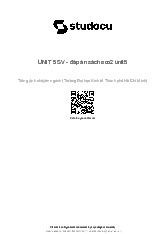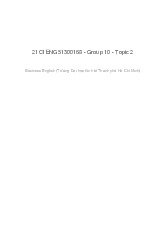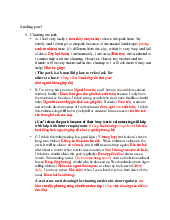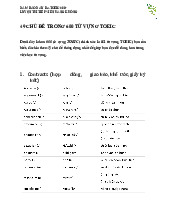




Preview text:
lOMoAR cPSD| 46578282
E12- ĐỀ HK1 - (Đề 2)
Mark the letter A, B, C, or D on your answer sheet to indicate the word whose underlined part differs from the
other three in pronunciation in each of the following questions. Question 1. A. organized B. escaped C. maintained D. explored Question 2. A. compose B. program C. compete D. pronounce
Mark the letter A, B, C, or D on your answer sheet to indicate the word that differs from the other three in the
position of primary stress in each of the following questions. Question 3. A. village B. purpose C. police D. student Question 4. A. engineer B. entertain C. national D. Vietnamese
Mark the letter A, B, C or D on your answer sheet to indicate the correct answer to each of the following questions.
Question 5. On ________ Internet and with cable television we can select information from a wide variety of sources. A. 0 B. an C. the D. a
Question 6. I’m sorry. I didn’t break the vase on ________. A. Time B. intention C. purpose D. my mind
Question 7. As soon as I _________ smoking, I felt a lot better. A. Took out B. gave out C. gave up D. took up
Question 8. I ________ a very beautiful child while I was walking on the beach. A. Was seeing B. have seen C. see D. saw
Question 9. By working hard, you _________ achieve the results you desire. A. Had better B. should C. would rather D. may
Question 10. _________ today, there would be nowhere for them to stay. A. Provided they arrive B. if they arrived C. if they arrive D. had they arrived
Question 11. The children were quite attracted by the tamer and his animals ________ were performing on the stage. A. Which B. whom C. that D. who
Question 12. I don’t feel like _________ to the cinema now because I’m under the weather. A. To have gone B. to go C. go D. going
Question 13. Our plan _________ by the members of the committee. A. Considers B. is being considered C. is considering D. considered
Question 14. Caring for a sick relative is the task that brings both ______ and pain. A. Pleased B. please C. pleasant D. pleasure
Question 15. The heavy rain has caused _________ in many parts of our country. A. Droughts B. wind C. floods D. snow
Question 16. An economic __________ is a time when there is very little economic activity, which causes a lot of unemployment and poverty. A. Mission B. depression C. floods D. development
Mark the letter A, B, C or D on your answer sheet to indicate the most suitable answer to complete each of the following exchanges. lOMoAR cPSD| 46578282
Question 17. John is complementing Jane n her new dress.
- John: You look great in this new dress. – Jane: ____________. A.
D not say anything about it. B. I am glad you like it. C. Not at all. D. With pleasure.
Question 18. Harry is talking to judy after Judy had helped Harry.
- Harry: Thanks for your help. – Judy: ___________.
A. Don’t mentiong it. That’s the least thing I could do. B. Me too C. Long time no see D. So long.
Mark the letter A, B, C, or D on your answer sheet to indicate the word CLOSEST in meaning to the
underlined word in each of the following questions.
Question 19. One must reside in the United States 5 years in order to apply for citizenship. A. Abundon B. accommodate to C. invade D. live in
Question 20. When being interviewed, you should concentrate on what the interviewer is saying or asking you. A. Be related to B. express C. pay attention to D. be interested in
Mark the letter A, B, C, or D on your answer sheet to indicate the word OPPOSITE in meaning to the
underlined word in each of the following questions.
Question 21. School uniform is required in most of Vnese schools. A. optional B. depended C. divided D. compulsory
Question 22. The proposal for a new high-speed railway will go ahead though it meets with strong opposition from the public. A. disagreement B. demand C. dislike D. support
Mark the letter A, B, C or D on your answer sheet to show the underlined part that needs correction in each of
the following questions.
Question 23. A basic knowledge of scial studies, such as history and geography, are considered a basic part of the education of every child. A. Child B. are C. basic D. history
Question 24. Many young people lack skills, good education, and financial to settle in the urban areas where many jobs are found. A. Urban areas B. financial C. are found D. the most
Question 25. It has been said that laser to be the most miraculous to cure patients. A. To be B. that C. has been said D. the most
Mark the letter A, B, C or D on your answer sheet to indicate the sentences that is closest in meaning to each of
the following question.
Question 26. I have never talked to the headmaster before.
A. It’s the first time I will ever have talked to the headmaster.
B. It’s the first time I had ever talked to the headmaster.
C. It’s the first time I ever talked to the headmaster.
D. It’s the first time I have ever talked to the headmaster.
Question 27. “I’m sorry I have to leave so early.” He said.
A. He apologized for having to leave early.
B. He apologized that he has to leave early.
C. He apologized to have to leave early. lOMoAR cPSD| 46578282
D. He apologized to have left early.
Question 28. I did not come to your party because of the rain.
A. Even though it rained, I came to your party.
B. If it did not rain, I would come to your party.
C. Suppose it did not rain, I would come to your party.
D. It was the rain that prevented me from coming to your party.
Question 29. I don’t remember the man. You met him at the canteen last week. A.
I don’t remember the man whom you met at the canteen last week.
B. I don’t remember the man whom you met him at the canteen last week.
C. I don’t remember the man that you met him at the canteen last week.
D. I don’t remember the man whose you met at the canteen last week.
Question 30. They spent more money. They had to work harder. A.
The more they spent money, the harder work they had.
B. The more money they spent, the more harder they had to work.
C. The more they spent money, the more hard work they had to work.
D. The more money they spent, the harder they had to work.
Read the following passage and mark the letter A, B, C, or D on your answer sheet to indicate the correct word
or phrase for each of the blanks.
Language is considered a significant (31)_________ of communication in international relations. People in modern
world have no longer been bound to their own countries. Moreover, in keeping (32)________ with speedy scientific
developments nowadays, they must widen their (33)_________ relations with those highly developed nations in other
parts of the world, owning to the fact that no one is able to (34)_________ with any natives in the world, it is necessary
for people to choose to learn a foreign language as a word-wide common means of communication (35)______ their
own mother tongue or native language. That is why English has been chosen by most people to be a foreign language
to master. More and more people use English and the number of those who lean English as a foreign language has been
increasing so rapidly that it has outnumbered that of any other.
Question 31. A. equipment B. means C. method D. way
Question 32. A. concerned B. on C. informed D. safe
Question 33. A. cooperative B. conflicting C. hostile D. diplomatic
Question 34. A. communicate B. agree C. deal D. contact
Question 35. A. besides B. additional C. beside D. moreover
Read the following passage and mark the letter A, B, C or D on your answer sheet to indicate the correct
answer to each of the questions.
Last week I went to visit Atlantic College, an excellent private college in Wales. Unusually, it gives young people much
needed experience of life outside the classroom, as well as the opportunity to study for their exams. The students, who
are aged between 16 and 18 and come from all over the world, spend the morning studying. In the a ernoon they go out
and do a really useful activity, such as helping on the farm, looking a er people with learning difficulties, or checking for pollution in rivers.
One of the great things about Atlantic College students is that they come from many different social backgrounds and
countries. As few can afford the fees of £20,000 over two years, grants are available. A quarter of the students are
British, and many of those can only attend because they receive government help. ‘I really admire the college for trying
to encourage international understanding among young people’, as Barbara Molenkamp, a student from the
Netherlands, said. ‘You learn to live with people and respect them, even the ones you don’t like. During the summer
holidays my mother couldn’t believe how much less I argued with my sister.’
To sum up, Atlantic College gives its students an excellent education, using methods which really seem to work.
Question 36. The word “it” is closest in meaning to _________. A. The cassroom B. life C. Atlantic College D. experience
Question 37. How has Barbara changed sice being at Atlantic College? lOMoAR cPSD| 46578282
A. She is more confident than her sister.
B. She prefers her new friends to her family.
C. She knows a lot about ther countries.
D. She finds it easier to get on with people.
Question 38. What can a reader find out from this text?
A. what the British education system is like.
B. what kind of programme Atlantic College offers.
C. what the British education system is like.
D. how to become a student at Atlantic College. Question
39. The word “argued” is closest in meaning to _________. A. Quarreled B. regarded C. respected D. admired
Question 40. The word “opportunity” is closest in meaning to __________. A. Chance B. lucky C. respect D. idea
Question 41. What is the writer's opinion of Atlantic College?
A. It doesn't allow students enough study time.
B. It doesn't give good value for money.
C. Its way of teaching is successful
D. Students are taught to like each other.
Question 42. What is the writer trying to do in the text?
A. givean opinion about a particular student.
B. describe the activities students do in their free time.
C. describe his own experience of education
D. give an opinion about a special type of education.
Read the following passage and mark the letter A, B, C or D on your answer sheet to indicate the correct
answer to each of the questions.
For more than six million American children, coming home after school means coming back to an empty house. Some
deal with the situation by watching TV. Some may hide. But all of them have something in common. They spend part
of each day alone. They are called “latchkey children”. They are children who look after themselves while their
parents work. And their bad condition has become a subject of concern.
Lynette Long was once the principal of an elementary school. She said, “we had a school rule against wearing jewelry.
A lot of kids had chains around their necks with keys attached. I was constantly telling them to put the keys inside
shirts. There were so many keys; it never came to my mind what they meant.” Slowly, she learned that they were house
keys. She and her husband began talking to the children who had keys. They learned of the effect working couples and
single parents were having on their children. Fear wasthe biggest problem faced by children at home alone. One in
three latchkey children the Longs talked to reported being frightened. Many had nightmares and were worried about
their own safety. The most common way latchkey children deal with their fears is by hiding. They may hide in a shower
stall, under a bed or in a closet. The second is TV. They often turn the volume up. It’s hard to get statistics on latchkey
children, the Longs have learned. Most parents are slow to admit that they leave their children alone.
Question 43. The phrase “they” means
A. latchkey children’s parents B. empty houses C. latchkey children’s D. all American children
Question 44. What is the most common way for latchkey children to deal with fears?
A. Talking to the Longs C. lying under a TV B. Hiding somewhere D. having a shower Question 45.
Lynette Long learned of latchkey children’s problems by. A. delivering questionaires B. visiting their homes C. interviewing their parents D. talking to them
Question 46. Why did a lot of kids have chains around their necks with keys attached?
A. They had to use the keys to enter their houses when they came home.
B. Schools didn’t allow them to wear jewelry, so they wore keys instead.
C. They were fully grown and had become independent.
D. They had to use the keys to enter their houses when they came home.
Question 47. The main problem of latchkey children is that they.
A. suffer a lot from being left alone B. are growing in numbers lOMoAR cPSD| 46578282
C. watch too much television during the day
D. are also found in middle-class families Question
48. The phrase “an empty house” in the passage mostly means
A. a house with no people inside
B. a house with nothing inside C. a house with no furniture
D. a house with too much space
Question 49. What do latchkey children suffer most from when they are at home alone? A. Tiredness B. Fear C. Boredom D. Lonliness
Question 50.The phrase “latchkey children” in the passage means children who
A. are locked inside houses with latches and keys
B. like to carry latches and keys with them everywhere
C. look after themselves while their parents are not at home
D. close doors with keys and watch TV by themselves




